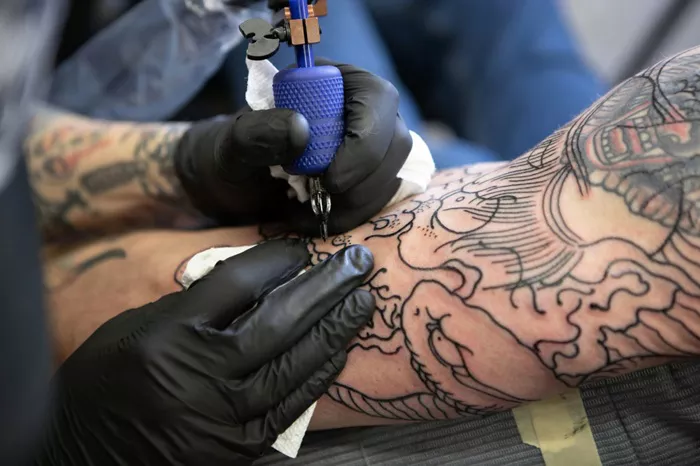In a groundbreaking move, the “Works on Skin” project in Berlin is blending contemporary art with tattoo culture by offering limited-edition artworks for customers to tattoo on their bodies. This innovative initiative is challenging the traditional boundaries of both the art world and tattoo industry.
Founded by Holm Friebe, the project provides a platform for established and emerging artists to sell their designs as numbered limited editions, offering buyers the exclusive right to have these works permanently inked onto their skin. Prices for these exclusive rights range from €100 for the first editions, escalating up to €2,000 for the final numbers. Buyers receive a signed fine-art print and a certificate that grants them the one-off privilege of transforming the artwork into a tattoo.
“Art on skin was the beginning of art history – before work on stone, wood, canvas, or paper,” said Friebe, emphasizing the return to tattooing’s roots as a form of artistic expression. The project includes designs from various artists, including Andreas Hachulla’s sketch of the Berghain nightclub sound system, Anna Nezhnaya’s playful wine-drinking woman, and pop artist Jim Avignon’s whimsical humanoid flame, which must be tattooed in a way that makes the fire appear to move with the body’s muscle.
However, the initiative has sparked mixed reactions within the tattoo world. Traditional tattoo studios, like Berlin’s Noia Tattoo, which operates without intermediaries, view the project as a commercialized take on the art form. Noia’s founder, Fatih Köker, expressed skepticism, saying, “We were ignored by the art world for ages, and now they are trying to play at our game.”
A key criticism of the project is its 50% commission fee, which some see as a high cut for the intermediary. However, Friebe defends this, explaining that the aim is to provide artists with long-term, sustainable income opportunities.
Copyright concerns also arise. The certificates provided with each purchase indicate that only one version of the artwork can exist on a human body, making it unique. However, this exclusivity runs counter to the history of tattooing, where designs are often copied and adapted.
Friebe, however, remains unconcerned about unauthorized reproductions of the designs, stating, “Go ahead. But that would be a tattoo tribute, not an artwork in its own right.”
Despite the controversy, “Works on Skin” has already sold 150 editions since its launch and plans to release new designs on April 17. The initiative represents a new frontier where the art world meets the world of tattoos, bringing fine art into an uncharted realm.
Related topics:

